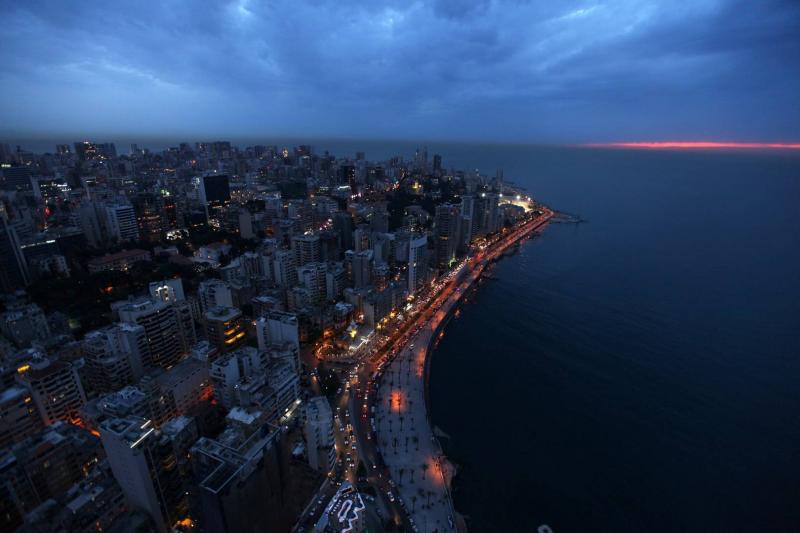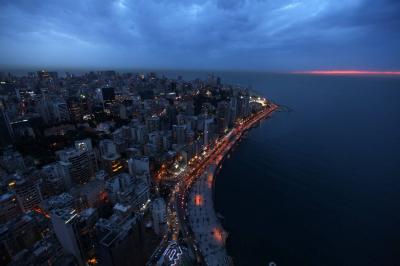Lebanese people are preoccupied with securing basic living necessities that have become difficult to obtain, contributing to the daily scene of Lebanese collapse, compounded by the paralysis of the public sector due to the ongoing open-ended strike by its employees, leading to the cessation of most services and the shortage of vital materials such as gasoline, bread, water, and electricity. While people are trying to adapt and cope with the crises through individual solutions, such as resorting to solar energy to handle the continuous power outages, they face new challenges every day that they find themselves unable to grapple with.
The latest crisis that has exploded in the faces of the Lebanese, after they had begun to feel some of its repercussions for a while, is the water crisis. A few days ago, Minister of Energy in the caretaker government Walid Fayyad announced that the service had dropped by 70 percent due to a lack of energy. The electricity cuts affect the pumping stations, a large number of which are either not operational or have reduced operation because the concerned parties are forced to secure diesel at inflated prices to operate them via generators.
After the people's voices rose significantly recently, especially in the capital Beirut due to water supply interruptions in some areas for the past 20 days, the Beirut and Mount Lebanon Water Authority announced that it was continuing “to provide all the services it can to the Lebanese, regardless of the harsh conditions the country is suffering under, which are reflected on the management and employees whose salaries have decreased by more than ninety-five percent.” The Authority spoke about “accumulated crises” leading to the current situation “starting with the scarcity of diesel that leads to severe water supply curtailment in more than sixty-five percent of the pumping stations, as well as malfunctions requiring spare parts in hard currency that the Authority does not possess, and the need to combat the consequences of thefts which are repeated at several stations.” The Authority called on “donor entities that had previously provided assistance, to continue supporting the Lebanese citizens in this difficult ordeal.”
Minister Fayyad sought international community assistance last weekend during a meeting with several ambassadors from Arab and foreign countries, during which he presented the reality of the water sector in Lebanon. Former General Director of the Ministry of Energy and Water Ghassan Baydoun considers that the absence of funding leads to an inability to secure the necessary fuels to generate electricity, which is essential for operating facilities and providing basic services, particularly water, and running hospitals and other vital facilities. He noted that what is happening is akin to a “domino” game where when one stone falls, the others fall sequentially. Baydoun highlighted in a statement to "Asharq Al-Awsat" that “the state typically expresses its existence through administrations, ministries, facilities, and the judiciary, all of which are experiencing significant decline under the open-ended strike of the public sector,” pointing out that “there are currently no solutions to the ongoing crises, especially the electricity crisis; rather, there are measures to alleviate its severity.” He added, “Initiating electricity production from gas is the logical and rational step that we should have taken a long time ago, but it seems that the Egyptian gas promised to us will not be released before proceeding with some of the required matters.”
The shortage of the Central Bank's reserves reflects on all sectors. It recently affected the bread bundle. Despite Minister of Economy Amin Salameh’s confirmation that “there is no bread crisis unless created by bakery owners since subsidies are still ongoing and credits are open,” bakery owners’ syndicate chief Ali Ibrahim indicated that the reason for the bread crisis is “the closure of several mills due to the unavailability of subsidized wheat,” adding, “We should expect the worst.”
Dozens of citizens line up in front of bakeries in most Lebanese regions since morning, seeking to secure a bread bundle for their families, while some merchants have resorted to selling it in the “black market” at exorbitant prices, prompting the Minister of Economy to refer news to the financial public prosecution “documented with numbers and evidence showing the sale of subsidized flour allocated for Arabic bread in the black market at inflated prices by the bakeries, and enhancing it to be used in pastry and confectionery, yielding them multiplied profits,” requesting swift action to hold them accountable.
Last weekend, several gas stations witnessed a return of long lines of cars following rumors of plans to price a gas canister in dollars and completely lift the subsidy on it by the Central Bank, which has been reaching its red lines in terms of reserves for some time. George Brax, a member of the gas stations owners' syndicate, attributed last weekend's crisis to “incorrect rumors about switching the price of gasoline from Sayrafa dollar to black market dollar, as well as delays in unloading a gasoline tanker,” explaining that “the tanker has begun unloading its cargo, and gasoline distribution has returned to normal at the stations.”
Economic experts believe “that we are heading sooner or later toward pricing gasoline in dollars after the diesel, paving the way for the dollarization of food and consumer products in supermarkets, including bread.” In this context, researcher in economic and financial affairs and university professor Dr. Layal Mansour clarifies that “the Lebanese economy has been dollarized for over 40 years, relying 20 to 30 percent on the dollar. Today, with recent measures taken, we are moving more and more toward increased dollarization, which may reach up to 90 percent, which represents a disaster. Therefore, what we demand is ‘comprehensive dollarization’ – that is to formally recognize the dollar as a national currency because any other remedy for the current crisis is no longer effective.”




